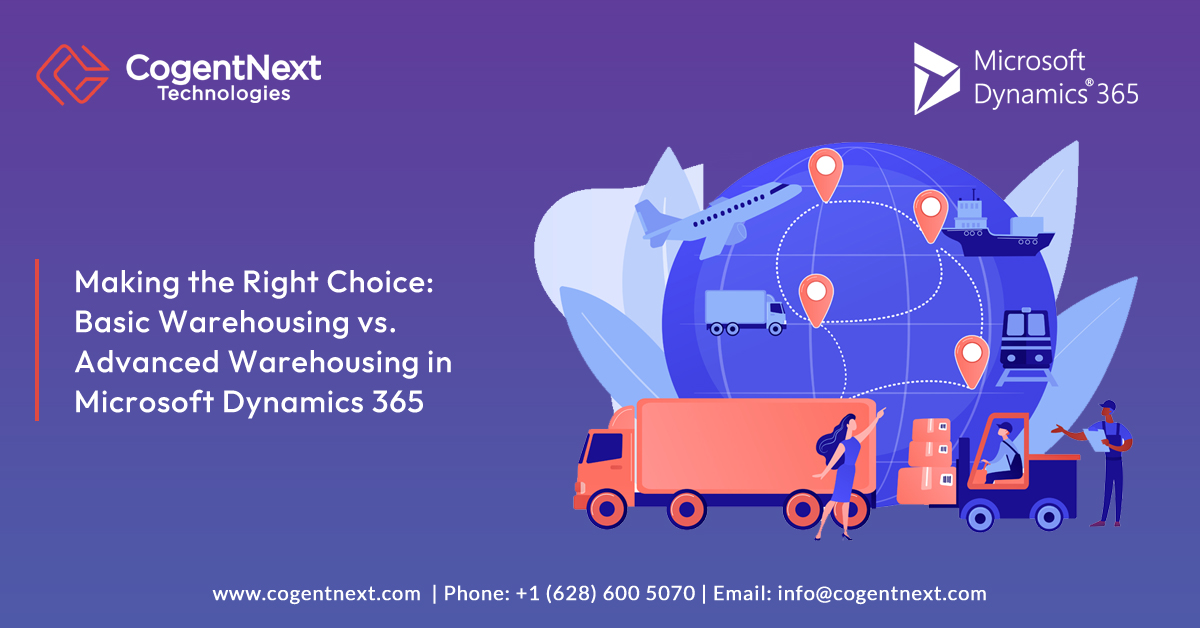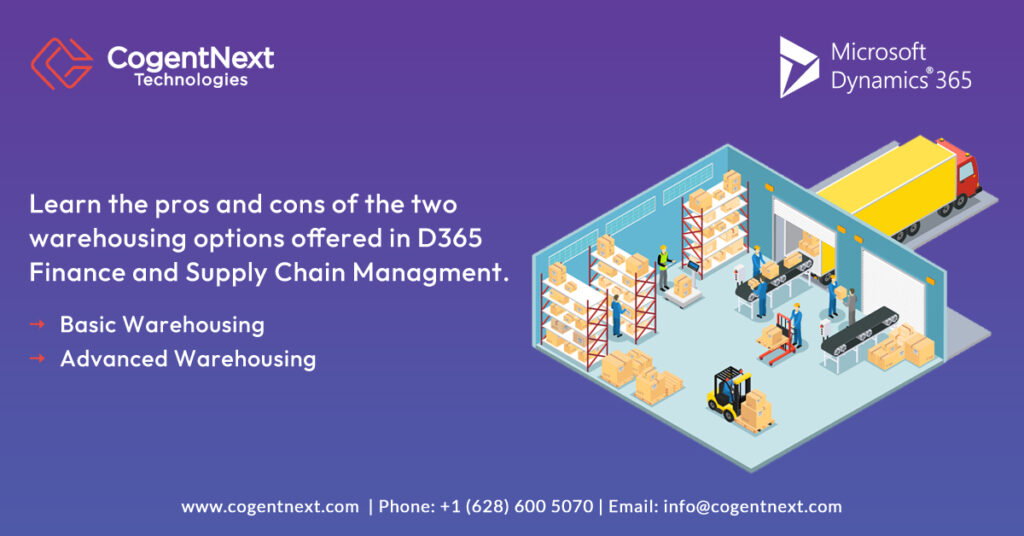
Making the Right Choice: Basic Warehousing vs. Advanced Warehousing in Microsoft Dynamics 365
When implementing Microsoft Dynamics 365 (D365) Finance and Supply Chain Management, businesses face important decisions regarding system configuration. One crucial aspect is determining how to handle distribution and logistics operations. One choice that merits careful consideration is whether to implement Basic Warehousing vs. Advanced Warehousing within D365. In this article, we will explore the pros and cons of each path as well as a few considerations for upgrading from Basic Warehousing to Advanced Warehousing in the future.
Dynamics 365 Basic Warehousing Overview
Basic Warehousing is a straightforward and efficient solution for implementing warehousing processes in D365. It offers a quick and efficient way to track essential business processes within the Enterprise Resource Planning (ERP) system. The learning curve for Basic Warehousing is minimal compared to the more comprehensive Advanced Warehousing feature set. Companies transitioning from legacy ERP systems that utilize simpler features, such as paper picking, will find Basic Warehousing familiar and easy to adopt.

Pros of Basic Warehousing:
- Quick implementation: Basic Warehousing allows companies to swiftly implement a warehousing solution that meets essential requirements, saving time and resources.
- Efficient for simple operations: If business operations are straightforward and streamlined, Basic Warehousing can effectively track inventory and processes without the need for complex validations and detailed reports.
Cons of Basic Warehousing:
- Manual processes: Basic Warehousing relies on paper-based processes, increasing the risk of operational errors and inefficiencies. Lack of system validation can lead to inventory inaccuracies and order fulfillment mistakes.
- Limited optimization opportunities: The absence of advanced rules and functionalities in Basic Warehousing limits the system’s ability to optimize warehouse activities, potentially resulting in higher costs and customer service issues.
Dynamics 365 Advanced Warehousing Overview
Advanced Warehousing in D365 offers expanded functionality and flexibility, making it a powerful option for businesses with more complex warehouse management needs. It leverages query-based rules within the Warehouse Management module, enabling features like work confirmations, business process rules, and full distribution support. Advanced Warehousing provides enhanced capabilities not available in Basic Warehousing, such as replenishment, cluster picking, and cross-docking.
Pros of Advanced Warehousing:
- Enhanced functionality: Advanced Warehousing provides comprehensive functionalities, including query-based rules, enabling businesses to optimize inventory movements, implement complex picking processes, and support distribution operations effectively.
- Increased flexibility: With Advanced Warehousing, businesses can configure locations to be license plate tracked or choose a hybrid approach, allowing for greater adaptability to specific warehouse requirements.
Cons of Advanced Warehousing:
- Steeper learning curve: Due to its configurability and flexibility, Advanced Warehousing has a higher learning curve, especially for users not accustomed to Tier 1 Warehouse Management Systems. Additional setup, including work rules and testing, may be required, impacting project timelines and budgets.
- Complex implementation: Setting up Advanced Warehousing is a more involved configuration process, including warehouse management parameters, location formats, types, profiles, wave templates, location directives, work templates, and mobile device menus. This can be time-consuming and resource intensive.
Transitioning from Basic Warehousing to Advanced Warehousing
Microsoft Dynamics 365 Finance and Supply Chain Management now offers the ability to switch from Basic Warehousing to Advanced Warehousing. After configuring items and locations, out-of-the-box periodic processes will assist with the transition. This flexibility allows businesses to start with Basic Warehousing for quick implementation and transition to more advanced functionality when ready.
Caveats of Starting with Basic and Transitioning to Advanced:
- Future growth and scalability: Configuring warehouses as Advanced Warehouses from the beginning provides a foundation for future expansion and optimization. It allows businesses to leverage advanced functionalities as they grow and evolve.
- Time and budget constraints: Basic Warehousing may be suitable for projects with quick timelines or limited budgets. However, businesses should consider futureproofing themselves by implementing the desired functionality upfront to save time and costs in the long run.
- Integration advantages: Implementing Advanced Warehousing within D365 Finance and Supply Chain Management ensures seamless integration with other capabilities, both back-office and customer-facing. This integration provides a comprehensive solution for businesses, eliminating the need for separate best-of-breed warehousing systems.
Conclusion:
Choosing between Basic and Advanced Warehousing in Microsoft Dynamics 365 Finance and Supply Chain Management requires careful evaluation of business requirements, project timelines, and budgets. Basic Warehousing offers a quick and efficient solution for simple operations, while Advanced Warehousing provides comprehensive functionality and flexibility for complex warehouse management needs. Upgrading from Basic to Advanced is now supported, allowing businesses to start small and transition to advanced features as they grow. Ultimately, the decision should align with the company’s long-term goals and the desire to optimize warehouse processes, reduce costs, and improve customer service.
Are you ready to optimize your warehouse management processes and unlock the full potential of your ERP? Whether you are considering Basic Warehousing for quick and efficient implementation or looking to leverage the advanced functionalities of Advanced Warehousing, our experts at CogentNext will guide you through the process. We understand the complexities of warehouse management and can tailor the solution to your unique operational needs.
Don’t let inefficient processes, inventory inaccuracies, and missed opportunities affect your business. Contact us today and take the first step towards maximizing efficiency, reducing costs, and delivering exceptional customer service.
By Chandra Subramanian | www.cogentnext.com
